As autumn sets in across the northern part of the world, Ukraine faces the winter months.
Russia is targeting Ukrainian cities like Kyiv, their power plants and other infrastructure using missiles and drones. Ukrainian President Volodymyr Zelenskyy said on social media that over the past week Russia has destroyed 30 percent of the country’s power plants. This has caused “massive blackouts across the country.”
As temperatures near zero Celsius, Ukrainians who have not fled the war ready themselves for winter.
Artem Panchenko is nine years old. Recently, he helped his grandmother tend a fire in their temporary, outdoor kitchen near their old apartment.
Just like hundreds of thousands of other Ukrainians, Artem and his grandmother are facing difficult conditions. They have been living without natural gas, water, and electricity for about three weeks since Russian missiles cut off utilities in their town, which is in the Kharkiv area of eastern Ukraine.
They survive by wearing warm clothes and cooking outside. As Artem helped his grandmother cook, he said, “It's really cold. I'm sleeping in my clothes in our apartment."
Roman Semenukha is an official in the Kharkiv government. He said that officials are working to restore electricity to the area in the coming days but that repairs to water and gas lines will come later. Officials are giving firewood to citizens instead.
He said that only after water and gas lines are repaired “…will we be able to begin to restore heating."
Viktor Palyanitsa is 37 years old and lives in the nearby village of Kurylivka. He has gathered enough wood for the whole winter. He is not able to sleep in his home because all the windows were destroyed.
He plans to sleep beside a wood-burning stove in an old building. He said that he is not waiting for the government’s help. He is ready to provide for himself throughout the winter.
"It's not comfortable. We spend a lot of time on gathering wood. You can see the situation we're living in. I have arms and legs. So I'm not scared of the cold, because I can find wood and heat the stove," Palyanitsa said.
Like Palyanitsa there are still thousands of Ukrainians living in homes that have been partly destroyed by Russian strikes, most with damaged roofs and windows. Officials in the Ukrainian controlled areas of Donetsk have told residents to leave the area and warned that services would not be returned by winter.
Even in other areas of Ukraine, the threat of a winter without heat is real.
Russian President Vladimir Putin has increased attacks on civilian energy centers after Ukraine’s strike on an important bridge in Crimea. This has left many cities without electricity including Kyiv, Sumy in the northeast, and Vinnystsia in the west.
Many in the town of Kurylivka have created basic shelters where residents live by candlelight, gather water from wells, and wear warm clothes to stay alive.
Iryna Panchenko is Artem’s grandmother. The two have been sleeping in an abandoned apartment next to their home because a Russian strike destroyed their windows.
"It's very cold living here. It's hard to cook, it's hard to run between the apartment and where we cook. My legs hurt,” Iryna Panchenko said.
Basic structures are a common sight along the apartment complex. Residents gather wood for fires so that they can cook outside.
Anton Serukov is 47 years old and his mother is disabled. He helps her with daily tasks like heating water over the fire for tea.
"No electricity, no water, no gas. We are cold. I'm making tea for my mother on the fire but she only drinks a little bit to warm up for a short time."
His mother Zoya Serukova had been unable to leave her bed for seven years and most of the time she keeps seated, playing cards.
"It's really cold now. If it weren't for my son, I would freeze," she said.
Serukov said that he has asked a friend from Kharkiv to purchase an electric heater for them, in case the power is restored. The thought of surviving a winter in this state is almost too much to think about.
"I hope we'll have electricity soon, so we can live through this winter somehow," Serukov said.
I’m Faith Pirlo.
Justin Spike wrote this article for The Associated Press. Faith Pirlo adapted it for Learning English.
______________________________________________________________________
Words in This Story
infrastructure – n. the basic equipment and structures (such as roads and bridges) needed for a country or area to operate
blackout – n. a period when lights are off because of an electrical power failure
tend –v. to take care of; to maintain
utility - n. a company that provides electricity, water, or similar services
apartment –n. a room or group of rooms in a building used for housing people
restore – v. to return (something) to an earlier or original condition by repairing it, or cleaning it
roof –n. the top of a house
well – n. a hole in the ground from which a supply of water is extracted
abandoned — adj. left without help or support
lean-to – n. a building such as a shed or garage which is attached to one wall of a larger building
disabled – adj. having a physical or mental disability
______________________________________________________________________
What do you think about this story?
We want to hear from you. We have a new comment system. Here is how it works:
- Write your comment in the box.
- Under the box, you can see four images for social media accounts. They are for Disqus, Facebook, Twitter and Google.
- Click on one image and a box appears. Enter the login for your social media account. Or you may create one on the Disqus system. It is a blue circle with “D” on it. It is free.
Each time you return to comment on the Learning English site, you can use your account and see your comments and replies to them. Our comment policy is here.



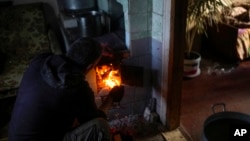


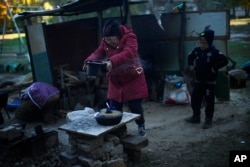
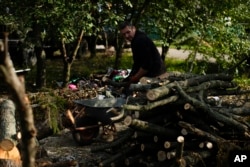
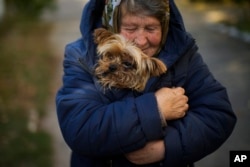
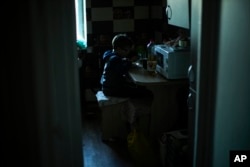
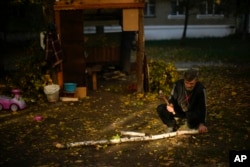
Forum